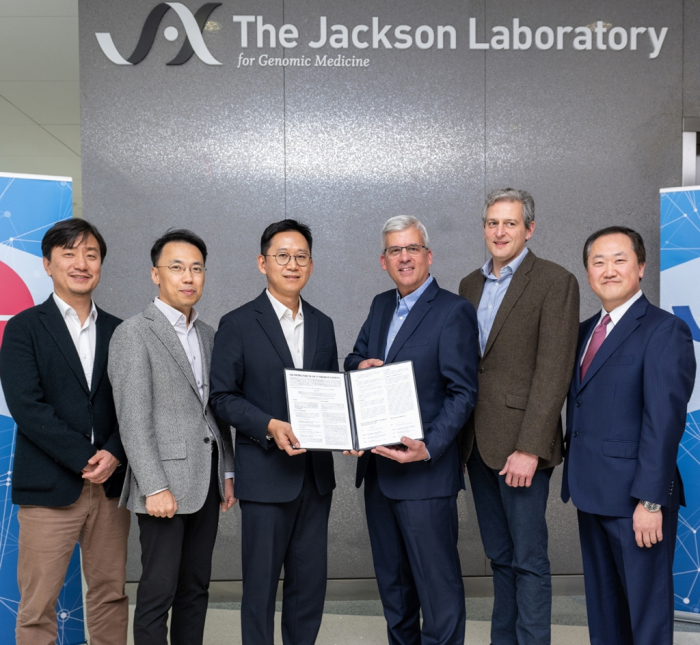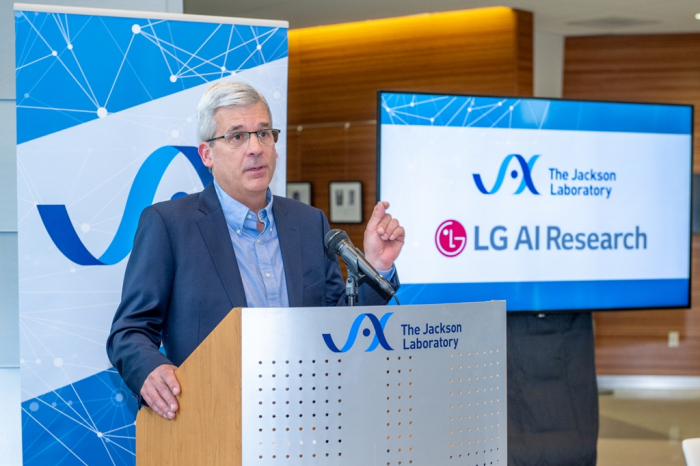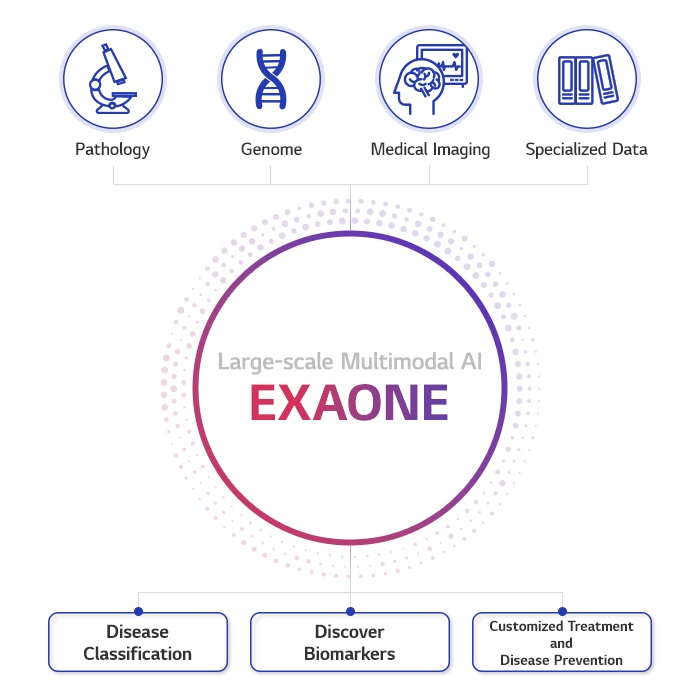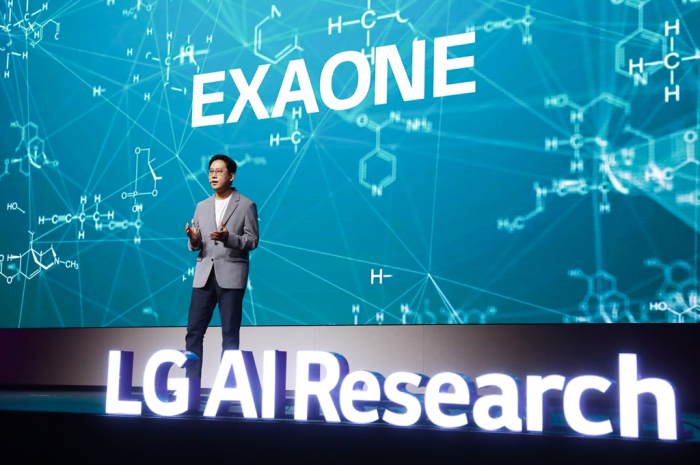LG, Jackson Lab to jointly develop AI models for Alzheimer’s, cancers
LG Group identifies AI, bio and clean technology as major future growth drivers
By Mar 11, 2024 (Gmt+09:00)
LG Chem to sell water filter business to Glenwood PE for $692 million


KT&G eyes overseas M&A after rejecting activist fund's offer


Kyobo Life poised to buy Japan’s SBI Group-owned savings bank


StockX in merger talks with Naver’s online reseller Kream


Meritz backs half of ex-manager’s $210 mn hedge fund



LG AI Research, the artificial intelligence research arm of South Korea’s LG Group, and the Jackson Laboratory (JAX), a US non-profit biomedical research institute, have agreed to jointly develop new AI models to detect, analyze and predict treatment for Alzheimer’s disease and various cancers.
Under the agreement, LG AI Research and JAX will develop AI models that analyze the onset and progression of Alzheimer’s and predict treatment effectiveness, thus paving the way for new drugs and human aging research.
"As society ages, there is increasing discussion about the application of AI in the field of healthcare. AI’s potential is particularly notable in diseases closely associated with genetics,” the statement said.
Established in 1929, Connecticut-based Jackson Lab is an independent, non-profit biomedical research organization that has produced 20 Nobel Prize laureates for their genomic research to increase understanding of human diseases, as well as advancing treatments and cures for cancer, neurological and immune disorders, diabetes, aging and heart disease.

The Jackson Laboratory for Genetic Medine, led by Charles Lee, an expert in precision medicine, researches the diagnosis and treatment of diseases that depend on genetic variations, according to JAX.
LG’S MULTIMODAL AI EXAONE
Under their partnership, the two organizations plan to improve the efficiency of disease diagnosis and treatment by having LG’s multimodal AI EXAONE train on data from The Jackson Laboratory’s research on the genetic characteristics of Alzheimer’s disease.
The Jackson Laboratory can design and produce laboratory mice with the Alzheimer’s gene.
“The lab has a vast amount of research data on diseases such as Alzheimer's and cancer that can design and produce genetically modified mice, therefore is expected to have significant synergy when combined with LG’s AI technology,” JAX said.

Lon Cardon, Jackson Lab’s chief executive, said, “LG AI Research shares our vision to maximize the value of AI and the potential to transform human health. Together, we can leverage our unique strengths to realize a future where AI and genetics revolutionize healthcare.”
Lee, scientific director of and professor at the Jackson Laboratory for Genomic Medicine, said, “We are thrilled to collaborate with LG AI Research to unleash the immense potential of AI in creating a data science bridge between humans and mouse models, which will advance our ability to predict human diseases and help in the development of new drugs and treatments.”
AI MODELS FOR CANCER DIAGNOSIS, TREATMENT
The two organizations will also collaborate to bring about “groundbreaking” changes not only in Alzheimer's disease treatment but also in the diagnosis and treatment of various cancers.
They will develop multimodal generative AI models that rapidly diagnose cancer from pathology images without expensive and specialized tests and predict treatment effectiveness as well as interactive generative AI models that suggest personalized cancer treatment options to physicians based on an individual’s genomic information.
“Both companies expect that AI will drastically shorten the development time for new drugs in the cancer field, including vaccines and therapeutics, from discovery through preclinical and clinical trials, and improve success rates,” the statement said.

BIOTECH, LG’S FUTURE GROWTH ENGINE
Bae Kyung-hoon, chief of LG AI Research, said LG has been conducting R&D to apply AI to various industries, particularly in the biotech sector, which is one of the Korean conglomerate’s future growth engines.
Koo Kwang-mo, chairman of LG Group, Korea’s fourth-largest conglomerate, visited Boston and Toronto last August to stay abreast of trends in bio and AI technologies.
“Biotech and AI, although just small seeds for LG now, will grow into future growth drivers for our group if we meet challenges without wavering,” he said.
LG has identified AI, bio and clean technology among its major growth businesses.
In 2022, LG AI Research developed a neoantigen prediction AI model that uses patient genetic information and cancer cell mutations to induce cancer cell death.
Last July, the research institute unveiled “EXAONE Discovery,” a generative AI platform that develops new drugs, new materials and new substances.
Write to Chae-Yeon Kim at why29@hankyung.com
In-Soo Nam edited this article.
-
 Artificial intelligenceKakao’s multimodal LLM Honeybee: Korea’s answer to Gemini, GPT-4
Artificial intelligenceKakao’s multimodal LLM Honeybee: Korea’s answer to Gemini, GPT-4Jan 19, 2024 (Gmt+09:00)
2 Min read -
 Artificial intelligenceLG unveils upgraded hyperscale AI for future businesses
Artificial intelligenceLG unveils upgraded hyperscale AI for future businessesJul 19, 2023 (Gmt+09:00)
2 Min read -
 Artificial intelligenceLG Group think tank unveils breakthrough AI tech Exaone
Artificial intelligenceLG Group think tank unveils breakthrough AI tech ExaoneDec 09, 2022 (Gmt+09:00)
1 Min read -
 Artificial intelligenceLG launches AI research think tank for digital transformation
Artificial intelligenceLG launches AI research think tank for digital transformationDec 07, 2020 (Gmt+09:00)
2 Min read


